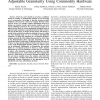Free Online Productivity Tools
i2Speak
i2Symbol
i2OCR
iTex2Img
iWeb2Print
iWeb2Shot
i2Type
iPdf2Split
iPdf2Merge
i2Bopomofo
i2Arabic
i2Style
i2Image
i2PDF
iLatex2Rtf
Sci2ools
132
click to vote
GLOBECOM
2010
IEEE
2010
IEEE
Constructing Secure Localization Systems with Adjustable Granularity Using Commodity Hardware
Proof of a user's identity is not always a sufficient means for making an authorization decision. In an increasing set of circumstances, knowledge of physical location provides additional and necessary context for making decisions about resource access. For example, sensitive information stored on a laptop (e.g. customer records, social security numbers, etc), may require additional protections if a user operates outside of an approved area. However, current localization techniques based on signal strength reporting or specialized hardware fail to achieve this goal. In this paper, we design, develop, deploy and measure a system which securely determines the location of a user to within one meter through using only off-the-shelf 802.11 and Bluetooth equipment. We apply this equipment in a two-phased challengeresponse protocol: first determining the general area of the client in the Regionalization phase and then pinpointing it in the Localization phase. Using nearly 32,000 data poi...
Authorization Decisions | Communications | Current Localization Techniques | GLOBECOM 2010 | Location Information |
Related Content
| Added | 11 Feb 2011 |
| Updated | 11 Feb 2011 |
| Type | Journal |
| Year | 2010 |
| Where | GLOBECOM |
| Authors | Patrick Traynor, Joshua Schiffman, Thomas F. La Porta, Patrick McDaniel, Abhrajit Ghosh |
Comments (0)

